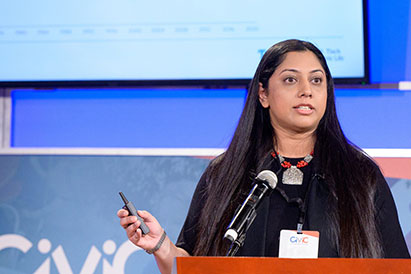
Teaching civics prepares students to be informed and engaged members of society. Students who experience high-quality civic education are more likely to complete college and develop employable skills (including communications and public speaking skills), vote and discuss policy issues at home, and volunteer and work on community issues.
However, prioritizing civics in the classroom can be difficult. According to research from The Brookings Institution, schools have reallocated instructional time from social studies toward key tested subjects, often prioritizing reading and math. This has become even more pronounced as class time has been disrupted by the ongoing pandemic. Teachers spend what time they do have in the classroom trying to catch students up and prepare them to meet grade-level requirements by the end of the year.
But teaching civics remains at least as important as ever, in preparing students to take their place in shaping our government and society now and long into the future.
Why make teaching civics a priority? We posed this question to iCivics Educator Network teachers and our staff members, and they responded with the following:
- As we approach 250 years of America’s independence, there is no better time to teach civics. Instilling the principles and virtues of our democratic society will prepare future generations to lead us through the rest of the 21st century. -Michael Reyes, Youth Fellowship Community Lead, iCivics
- The reason for teaching civics has always been about helping to inspire the next generation to be active and productive citizens. -Janet Wills, iCivics Educator Network Teacher
- Teaching civics helps students connect past and present in order to be informed voters. It helps students make meaning of current events and reassures them that nationally and internationally, there is precedent for solving modern issues. Civics also helps students engage in critical thinking and writing, which engages those 21st century skills that will be essential in their future. In examining civics, we cultivate empathy. -Amanda Setters, Curriculum Associate, iCivics
- Civics is the language of the citizenry. It’s how we communicate and plan and execute the change we desire. When people aren’t prepared to find this voice, ask these questions, and learn their role in the community and the democracy, they miss out on a major opportunity to be part of something meaningful—and they resign that power, those decisions, to someone else. The returns on civic education, or lack of it, are cumulative and transformative. -Christian Swagger, Educator Network Teacher
- Civics is a shared reality. Regardless of where people fall on the current divide du jour, we are all a part of something bigger than ourselves. Civic skills have to endure, and they have to be taught. -Carrie Ray-Hill, Senior Director of Digital Learning, iCivics
- No matter what plans students have for life after high school—whatever their career plans, however they may continue their education—all students will be members of communities where they will need agency to raise their voices and make an impact. Civics teaches skills, knowledge, and disposition that will be needed by all. -Shannon Salter, iCivics Educator Network Teacher
- Civic education is important because it is the passport to the future. The future belongs to those who prepare and educate themselves today. -Angela Clay, Educating for American Democracy Curriculum Associate, iCivics
- Understanding civics empowers change. The founders intentionally created a system that could endure by allowing citizens to make changes that could benefit society as a whole. -Beth Doman Doughty, iCivics Educator Network Teacher
- In a digital age, it is easy to have knowledge of all of the wrong things. Teaching civics allows students to learn valuable skills that are conducive to critical thinking. It helps students understand how important decisions have molded the country and continue to set precedents as time goes on. I think the statement of “history repeats itself,” applies beautifully here in a sense that knowledge allows for personal action to prevent further repetition. -Niko Garcia, Curriculum Intern, iCivics
- I like to think of teaching civics as giving students the opportunity to practice civic skills they are going to need when it becomes their turn to play in the real game. -Tia Costello, iCivics Educator Network Teacher
- At its root, civics is about how we all live together, as different as we all are from each other. To do civics well, everybody needs practice, just as we all do in learning to read, write, do math, and cook a decent meal. -David Buchanan, Director of Massachusetts Programs, iCivics
- Everyone needs civics. It is the fabric of civilization. Contributing to the advancement of one’s community and society and understanding how to navigate through the perils and roadblocks is of the utmost importance if we want to continue to govern ourselves in a productive manner. -Kymberli April, iCivics Educator Network Teacher
- A government “of the people” can only exist if the people understand how their government works, and are willing to participate in it. Teaching civics is the pathway for meeting both of those goals. -Lora DeSalvo, Curriculum Associate, iCivics
- Civic education has massive cross-partisan appeal as a solution to what ails our democracy. The public overwhelmingly agrees that our country needs K-12 civic education! -Abbie Kaplan, Federal Policy Associate, iCivics
On the iCivics blog, multiple perspectives contribute to the public conversation about civic education in the United States. Each contributor represents their own opinion. We welcome this diversity of perspectives. Responses in this blog post have been edited for brevity and clarity.





